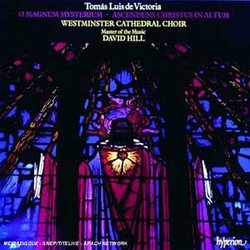| All Artists: Tomas Luis de Victoria, David Hill, Westminster Cathedral Choir Title: Victoria: O Magnum Mysterium; Ascendens Christus in altum Members Wishing: 2 Total Copies: 0 Label: Hyperion UK Release Date: 11/11/1993 Album Type: Import Genre: Classical Style: Opera & Classical Vocal Number of Discs: 1 SwapaCD Credits: 1 UPC: 034571161907 |
Search - Tomas Luis de Victoria, David Hill, Westminster Cathedral Choir :: Victoria: O Magnum Mysterium; Ascendens Christus in altum
 | Tomas Luis de Victoria, David Hill, Westminster Cathedral Choir Victoria: O Magnum Mysterium; Ascendens Christus in altum Genre: Classical
|
Larger Image |
CD DetailsSimilar CDs |
CD ReviewsVICTORIOUS DAVID BRYSON | Glossop Derbyshire England | 01/30/2004 (5 out of 5 stars) "Tomas Luis de Victoria was a Spanish priest, an acquaintance of Palestrina and Lassus. His personal style in his polyphonic masses and motets is a strongly marked one easily distinguished from those of his great contemporaries. Like Palestrina he favours relatively unbroken vocal lines and in general he also avoids the antiphonal effects adopted by the Flemish school of the period and earlier, Lassus and before Lassus Josquin. There the resemblance to Palestrina ends, for me at least. There is a `swarthy' tone to Victoria's music that does not achieve, probably does not aim at, the characteristic radiance and serenity of the Italian master, nor on the other hand the calm but depthless sorrow of his Stabat Mater. It is also a more emotional, if not quite more `extrovert' idiom than Palestrina's, and it is notable that all Victoria's masses are based on upbeat and joyful motets.The polyphony is basically four-part, but varies at different points from three to five. The two motets are given here as well as the masses derived from them, the motets majoring in alleluia's - Ascendens has no fewer than five in its short compass. In each mass the composer sets the text of the Agnus Dei only once, but Hill and the Westminster Cathedral choir follow what I believe to be the standard practice of giving it a second time, with the music to `miserere nobis' adapted to `dona nobis pacem' the second time. As each phrase has six syllables accentuated in the same places, I can only imagine that this was the composer's intention. The recorded quality is not the most `forward' or striking that I have heard recently in similar productions, but there is nothing about it that would have me even consider witholding a fifth star from the disc. The performance is idiomatic and accomplished, with a proper sense of sharing the exultant feel inherent in the music. It may be one of the happier consequences of the straitened financial position of the classical music industry that there is currently such a superb selection available of ancient music, which must be less expensive to record than, say, Mahler or Shostakovich. Westminster Cathedral is, in the last resort, a parish church, and its younger choristers at least, maybe all of them, cannot by definition be professionals. The sense here is one of belief in as well as enthusiasm for and close familiarity with the idiom of this kind of music. The professionalism in the best sense comes from the directing, and I can only wonder how many performances as accomplished as this the composer himself was privileged to hear." A wonderful, soaring experience DAVID BRYSON | 01/08/1999 (5 out of 5 stars) "Anyone who loves choral music should discover Victoria. This is a sublime introduction." Great! DAVID BRYSON | 01/12/2000 (5 out of 5 stars) "My high school concert choir sang O Magnum Mysterium this year. This is the most wonderful recording I have ever heard!"
|

 Track Listings (14) - Disc #1
Track Listings (14) - Disc #1


